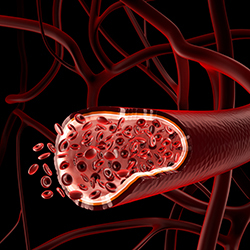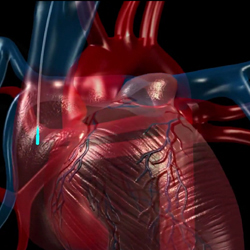This webinar will discuss the rationale for including functional assessments in repeat-dose toxicology studies, how the data can be used for more impactful risk assessments, and the potential for more relevant clinical biomarker strategies. Participants will also gain exposure to new methods of collecting functional endpoints through comparisons to existing methodologies.
Cardiovascular liabilities are a leading cause of drug development attrition. Cardiovascular (CV) risk assessment requires a thorough understanding of pathogenesis, structural changes, and functional changes. This presentation discusses the rationale for including CV structural and functional endpoints in repeat-dose toxicity studies and the efficacy of gathering these endpoints via implantable versus jacketed external telemetry.
Safety Pharmacology studies assess the undesirable pharmacodynamic, or functional, effects of a test article. This contrasts with traditional toxicology studies, which focus on structural pathological effects.
The ICH guidelines and the field of safety pharmacology were developed in response to public health issues caused exclusively by small molecule drugs, which can cause a variety of off-target pharmacological effects. Subsequently, drug development scientists and regulators began to learn that large molecule drugs (biologics) behaved differently and required a different approach from what was being used for routine non-clinical safety assessment. Guidelines are given in the ICH Topic S6 guideline (Preclinical Safety Evaluation of Biotechnology-Derived Pharmaceuticals), revised in 2011. The unique characteristics of biologics made the conduct of traditional acute cardiovascular safety pharmacology studies in dogs and non-human primates impractical.
Due to the phylogenetic similarity between human and nonhuman primates, they are the favored models for safety assessment studies of biologics intended for human patients. Since traditional safety pharmacology studies are inappropriate for biologics, it has been proposed by some that the solution is simply to combine the collection of functional (safety pharmacology) endpoints into repeat dose toxicology studies in non-human primates.
Nearly all in vivo cardiovascular safety pharmacology studies are now performed in chronically instrumented conscious animals using telemetry. For most drug candidates, these animals can be reused in subsequent studies with other drugs following an appropriate washout period. Many laboratories maintain a colony of instrumented animals from which study animals are selected and then returned. Due to the different characteristics of small and large molecule drugs that were previously described, protocols for animal reuse depend on the type of molecule being studied.
The collection of functional endpoints from repeat dose toxicology studies in non-rodents was pioneered by DSI and its customers with the development of the noninvasive JET™ external telemetry system in 2007. This system dramatically improved the quality of the data that can be collected from these animals and has thus allowed a more sensitive assessment of unexpected functional cardiovascular or respiratory effects of biotechnology-derived drugs.
In 2014, DSI released the PhysioTel Digital M series telemetry implants. These devices were designed for toxicologists seeking lower cost implants for use in studies with shorter duration and/or more test subjects. Importantly, researchers have found no histopathology issues following study completion.
Until recently, many toxicologists believed that the surgical implantation of sensors and telemetry devices would cause pathology that would confound the toxicologic pathology endpoints being evaluated in the study. However, consultation with experienced pathologists participating in the HESI Cardiac Safety Technical Committee has largely removed this concern. Pathologists are confident that they can easily distinguish pathology related to implanted foreign bodies from the pathological effects of experimental drugs. As several pathologists pointed out, aseptically-implanted telemetry devices produce considerably less pathology than chronically-implanted catheters used in toxicology studies using IV infusion, which are routinely conducted, especially with biologics.
The theory and practical study designs currently used to assess cardiovascular risk in repeat dose toxicity studies. They will further describe considerations for physiologic monitoring equipment selection and how the equipment used impacts the design and conduct of toxicity studies.
Speakers

Brian R. Berridge, DVM, PhD, DACVP, Director and Head of WW Animal Research Strategy in the Office of Animal Welfare, Ethics and Strategy, GlaxoSmithKline
Brian Berridge is Director and Head of WW Animal Research Strategy in the Office of Animal Welfare, Ethics and Strategy at GlaxoSmithKline. In that position he leads efforts to advance the scientific impact of animal and non-animal modeling in support of Pharmaceutical development. He has held previous positions as a Director of Regulatory & Discovery Pathology at GSK and Principal Research Pathologist at Eli Lilly & Company.
Brian is an Oklahoma State University-trained veterinarian with residency and PhD training from Texas A&M University. He is a Diplomate of the American College of Veterinary Pathologists and holds an adjunct Associate Professor position in the Department of Population Health and Pathobiology at North Carolina State University. He additionally teaches cardiovascular toxicology at the University of North Carolina. He is a member of the Executive Board and Board of Trustees for the ILSI Health and Environmental Sciences Institute where he also co-chairs the HESI Cardiac Safety Technical Committee, the Integrated CV Strategies Working Group (with DSI’s own Dusty Sarazan), and the Translational Preclinical Imaging Technical Committee. Brian also chairs an international effort to harmonize cardiovascular nomenclature in regulatory toxicologic pathology and a CV Specialty Interest Group within the Society of Toxicologic Pathologists.

Jonathan Heyen, M.S., D.A.B.T., Senior Principal Scientist - Safety Pharmacology Department, Pfizer La Jolla
Jonathan (Jon) Heyen is currently a senior principal scientist working in the Safety Pharmacology department at Pfizer La Jolla. Jon has 15 years of Pharmaceutical experience in cardiovascular drug discovery and drug safety. Jon’s current roles include investigation of the potential effects of novel therapies on the cardiovascular system, drug safety team leader for multiple projects and also leading the cardiovascular imaging group within Safety Pharmacology. Jon completed his undergraduate and graduate degrees at the University of Illinois-Champaign Urbana. He is an active member of several ILSI/HESI initiatives, applied Pharmaceutical toxicology and the Safety Pharmacology Society.
Who Should Attend?
This webinar is intended for anyone working in preclinical biomedical research who has an interest in conducting integrated studies combining both structural and functional endpoints. Attendees may include research scientists and technicians, veterinarians, study directors, and biomedical engineers.
Xtalks Partner
DSI
DSI is a pioneering biomedical research company focused on preclinical systems physiology and pharmacology. The recognized global leader in physiologic monitoring, DSI offers telemetry, instrumentation, software and services that facilitate accelerated, well-informed, drug therapy and development decisions.
DSI serves many industries including: Pharmaceuticals, Academia, Contract Research Organizations, Biological and Chemical defense, the Medical Device Industry, Government, and Biotechnology companies. We offer solutions that are tailored specifically to meet the unique research needs of our customers.
Media Partner
You Must Login To Register for this Free Webinar
Already have an account? LOGIN HERE. If you don’t have an account you need to create a free account.
Create Account



